Professor & Student Collaborate on Project in West Africa
August 26, 2003
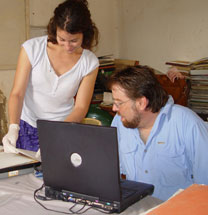 August 26, 2003, Greencastle, Ind. - Even though the school year doesn't begin until tomorrow, political science instructor Brett O'Bannon and one of his students, senior Abigail Kelly, had a summer filled with learning experiences. The pair spent summer break in the Senegal River Valley of West Africa, working on a project that is designed to benefit scholars worldwide for generations.
August 26, 2003, Greencastle, Ind. - Even though the school year doesn't begin until tomorrow, political science instructor Brett O'Bannon and one of his students, senior Abigail Kelly, had a summer filled with learning experiences. The pair spent summer break in the Senegal River Valley of West Africa, working on a project that is designed to benefit scholars worldwide for generations.
O'Bannon and Kelly worked on the Adrian Adams-So Project, which is endeavoring to catalogue, preserve, and make accessible the life's work of Adams, a noted anthropologist, activist and 25-year resident of the Senegal River Valley. "The project is still in the preliminary stages and, thus, it is a most exciting time to be a part of the project," notes O'Bannon. "What we accomplish with these first steps will reap dividends for future generations of scholars and all who have an interest in the region. A better understanding of her life and her many and varied works will aid in our understanding of the conditions for sustainable development, the dynamics of 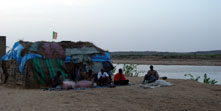 rural change and the causes and mechanisms of conflict and cooperation."
rural change and the causes and mechanisms of conflict and cooperation."
The faculty member adds, "Working with Abby this summer was a great experience for me as a teacher and a researcher. As a researcher, her participation was invaluable. She was never merely an assistant. Hers was the contribution of a colleague in everyway. We brainstormed through unexpected logistical and technical problems, we debated very serious ethical matters related to the often sensitive nature of our archival work, and we shot and catalogued over 10 gigabytes of images, just to mention a few aspects of this summer's work. As a teacher, it was a pleasure watching a newcomer to West Africa negotiate the very difficult circumstances in which we lived and worked, the least of which were the very high temperatures. This s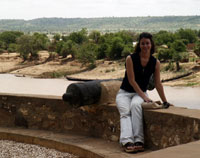 ort of trip is not for everyone, but Abby's linguistic talents, her prior travel to South Africa on a Winter Term Course, and her genuine intellectual curiosity made her a uniquely well qualified candidate for such a venture. I was quite fortunate to have her along."
ort of trip is not for everyone, but Abby's linguistic talents, her prior travel to South Africa on a Winter Term Course, and her genuine intellectual curiosity made her a uniquely well qualified candidate for such a venture. I was quite fortunate to have her along."
Adrian Adams resigned from the faculty at the University of Aberdeen, Scotland in 1975, and dedicated her life from that point forward to living and working with the people of the Senegal River Valley. For 25 years, Adams resided in the small village of Khounghani, near the town of Bakel, across the river from Mauritania. Hers was a life dedicated to service. She helped organize a peasant's federation whose function is to safeguard landholdings and a way of life threatened by privatization and various other state policies. She also worked tirelessly in the area of indigenous literacy. Adrian's acquisition of the local languages, especially Soninké and Pulaar, came at such a pace and with such fluency that locals now describe her in mystical terms.  Every Sunday, Adrian traveled from village to village, teaching children how to read and write their own languages. Adrian even crafted her own primers, in which she drew the very characters her stories portrayed.
Every Sunday, Adrian traveled from village to village, teaching children how to read and write their own languages. Adrian even crafted her own primers, in which she drew the very characters her stories portrayed.
In my initial efforts this past summer to draft a preliminary catalogue of her works, I discovered a few of her other talents," O'Bannon says. "While continuing her scholarly work (several books, many articles, etc.) she found time to write a novel (about her husband) and a play (both unpublished, as of yet) while also engaging in local and global activism on the question of the social and environmental consequences of dam construction. She even dabbled in biology, publishing the book Poissons et Pêches dans la Vallée du Flueve de Sénégal (Fish and Fishing in the Senegal River Valley).
On August 2, 2000 Adrian Adams was killed in a car accident while traveling to Dakar to deliver a report to the new democratic government. Having lived, and ultimately died, in the service of the river valley, the author of A Claim to Land by the River was, in fact, laid to rest in a plot by the River Senegal. "I am proud to have been asked by the family and estate of Adrian to head the effort to 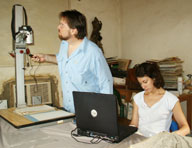 preserve, archive and make available her many and varied works. It is an honor I cherish," O'Bannon states.
preserve, archive and make available her many and varied works. It is an honor I cherish," O'Bannon states.
He adds, "Although we are at the very earliest stages of this project, it is clear that there is great and growing interest here, in Europe, and in Africa. We hope to convene in November in Dakar, the first board of directors meeting of the Adrian Adams-Sow foundation, which will endeavor to carry on with various aspects of her work, especially in the area of literacy. I am also happy to announce that in meetings in Washington D.C., in early December, David Robinson, director of the African Online Digital Library informed me of his desire to open at the AODL a gallery dedicated to Adrian. 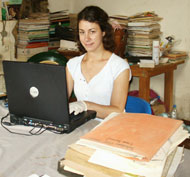 During other talks in Washington I was informed of the likely interest of the famed Institute Fondamental d'Afrique Noir in parts of Adrian's collection. The likes of Cheikh Hamidou Kane, one of Africa's most celebrated authors, John Hargreaves the noted colonial historian, and even special adviser to the President of the Republic of Senegal Mame Bassine Niang are keenly interested in this project. I must say that at this early stage in my career, I am most fortunate, indeed, to be working with such luminaries as Monsieur Kane. Further, it was a joy to have Abby -- who is a very sharp, talented and dedicated student -- with me to contribute to the project. We both witnessed a lot and learned much. It was a richly productive summer."
During other talks in Washington I was informed of the likely interest of the famed Institute Fondamental d'Afrique Noir in parts of Adrian's collection. The likes of Cheikh Hamidou Kane, one of Africa's most celebrated authors, John Hargreaves the noted colonial historian, and even special adviser to the President of the Republic of Senegal Mame Bassine Niang are keenly interested in this project. I must say that at this early stage in my career, I am most fortunate, indeed, to be working with such luminaries as Monsieur Kane. Further, it was a joy to have Abby -- who is a very sharp, talented and dedicated student -- with me to contribute to the project. We both witnessed a lot and learned much. It was a richly productive summer."
